Mysterious Watson Brake: Old Mound Complex In North America With Earthworks Raised For Unknown Purpose
Ellen Lloyd - AncientPages.com - In northern Louisiana, North America, there is a very interesting and mysterious ancient site known as Watson Brake. This ancient site challenges our knowledge about North American history as the mounds are some of the earliest known remnants of human construction in the New World.
Mounds At Watson Brake Were Raised By Complex Ancient Society
Located in the floodplain of the Ouachita River near Monroe, Watson Brake consists of 11 ancient mounds that measure from three to 25 feet in height.
Some sections of the oval-shaped earth berm probably have been eroded by rains and floods during the past 5,000 years. Credit: Northeastern State University
The construction of the mounds started about 5,400 years ago, predating other similar public architecture at Indian sites by nearly 2,000 years. This suggests the region was inhabited by a pre-agriculture, pre-ceramic hunting society that was much more socially complex than previously thought.
What we understand about the Mound Builders is changing due to research in the last decade.
What Was the Purpose Of The Mounds?
According to many archaeologists, the purpose of the mounds is unknown. Since no human remains or ceremonial objects have been found, perhaps the mounds were not used for burial or religious purposes.
Artist's conception of Watson Brake. Credit: Herb Roe - CC BY-SA 4.0
On the other hand, the area enclosed by the mounds was kept clean of debris, suggesting its use as a ritual space. The reasons why such elaborate activities first occurred here remain elusive. Another possibility is that the mounds were originally built to protect Native Americans from floods.h
Yet, it seems logical to assume our ancestors must have had a reason for building these mounds. The surfaces of the ridges and mounds show little evidence of occupation, leading archaeologists to believe that Watson Brake was occupied primarily before and during the building of the mounds.
William F. Romain, Ph.D., who runs the Ancient Earthworks Project, believes Watson Brake is the oldest solstice-aligned earthwork complex in the Americas.
The ancient mounds are very difficult to access because half of the site is on private property, making it very restricted. The Archaeological Conservancy purchased the other half of the site in 1996.
In 2014, William F. Romain was finally given permission to visit the site. He invited Dick Shiels, Director of the Newark Earthworks Center, and Bill Monaghan, Associate Director of the Glenn Black Laboratory, to accompany him. Using LIDAR technology, William F. Romain discovered Watson Brake was indeed an important archaeoastronomical site that our ancestors used for sky-watching.
The theory that Watson Brake was an ancient astronomical site is not far-fetched. Watson Brake is just like Poverty Point, located in Louisiana.
Poverty Point is still a place that remains a prehistoric mystery. The massive earthworks at Poverty Point near Epps were long considered the beginning of extensive mound construction. It has been suggested that the Poverty Point octagon was the world's largest ancient solstice marker.
Researchers now have reason to believe that mound construction was widespread by 3000 BC in northern and southern Louisiana, Mississippi, and Florida based on numerous discoveries.
Were the Watson Brake mounds and massive earthworks at Poverty Point built by the same culture?
Some scientists think the ancient mounds at Watson Brake might have been raised without a purpose.
Poverty Point Octagon. Credit: Steven Patricia
"I know it sounds awfully Zen-like, but maybe the answer is that building them was the purpose, 'Dr. Bruce D. Smith, an archeologist and specialist in early American agriculture at the Smithsonian Institution in Washington, said.
Tristam Kidder, associate professor of anthropology at Tulane University, said the archaeological sites found along the Ouachita River are typical of those found elsewhere in the southeastern United States and unique. They are unique in that they are older, but the earlier sites are more or less similar to the rest of the southeast in general characteristics, Kidder said.
It is challenging to say anything with certainty about Watson Brake. Few archaeological excavations have been conducted at the site, and the full extent of the first earthworks is not yet known.
Watson Brake's earthworks testify to the complexity of an ancient culture that remains largely a mystery.
Updated on September 22, 2023
Written by Ellen Lloyd – AncientPages.com
Copyright © AncientPages.com All rights reserved. This material may not be published, broadcast, rewritten or redistributed in whole or part without the express written permission of AncientPages.com
Expand for referencesMore From Ancient Pages
-
 Underground Catacombs Of Alexandria: Ancient Time Capsule Which Remained Hidden For Almost Two Millennia
Featured Stories | Sep 20, 2016
Underground Catacombs Of Alexandria: Ancient Time Capsule Which Remained Hidden For Almost Two Millennia
Featured Stories | Sep 20, 2016 -
 Lhasa’s Potala Palace: Greatest Building In Tibet With History Of 1300 Years
Civilizations | Nov 23, 2018
Lhasa’s Potala Palace: Greatest Building In Tibet With History Of 1300 Years
Civilizations | Nov 23, 2018 -
 Unexplained Encounters With Unknown Beings In California – Old And Modern Reports
Featured Stories | Mar 11, 2024
Unexplained Encounters With Unknown Beings In California – Old And Modern Reports
Featured Stories | Mar 11, 2024 -
 Ukko: Karelian-Finnish God Of Thunderstorms, Harvest, Patron Of Crops And Cattle
Featured Stories | Apr 2, 2020
Ukko: Karelian-Finnish God Of Thunderstorms, Harvest, Patron Of Crops And Cattle
Featured Stories | Apr 2, 2020 -
 Tomb Of God Thoth’s High Priest Discovered In Ancient Egyptian Necropolis
Archaeology | Feb 27, 2018
Tomb Of God Thoth’s High Priest Discovered In Ancient Egyptian Necropolis
Archaeology | Feb 27, 2018 -
 Mysterious Sumerian Queen Puabi And Her Magnificent Underground Burial Complex – Many Followed Her To Afterlife
Featured Stories | Oct 20, 2016
Mysterious Sumerian Queen Puabi And Her Magnificent Underground Burial Complex – Many Followed Her To Afterlife
Featured Stories | Oct 20, 2016 -
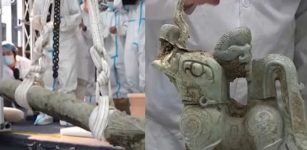 Statue Of Unknown Mythical Beast With Four Wings Discovered
Archaeology | Sep 1, 2022
Statue Of Unknown Mythical Beast With Four Wings Discovered
Archaeology | Sep 1, 2022 -
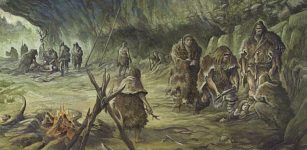 Neanderthals Buried Their Dead – New Evidence
Archaeology | Dec 10, 2020
Neanderthals Buried Their Dead – New Evidence
Archaeology | Dec 10, 2020 -
 Goddess Huitaca – Moon Goddess Of Intoxication, Joyful Life And Unlimited Pleasures In Muisca Mythology
Featured Stories | Mar 14, 2021
Goddess Huitaca – Moon Goddess Of Intoxication, Joyful Life And Unlimited Pleasures In Muisca Mythology
Featured Stories | Mar 14, 2021 -
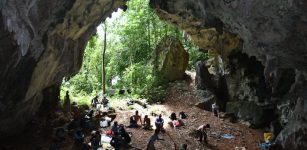 DNA Study Shows Pre-Historic Wallacea Was A Melting Pot Of Human Genetic Ancestries
Archaeology | Jun 9, 2022
DNA Study Shows Pre-Historic Wallacea Was A Melting Pot Of Human Genetic Ancestries
Archaeology | Jun 9, 2022 -
 Ancient Mysteries And Curious Legends Of Chimney Rock And Grandfather Mountain In North Carolina
Featured Stories | Feb 5, 2024
Ancient Mysteries And Curious Legends Of Chimney Rock And Grandfather Mountain In North Carolina
Featured Stories | Feb 5, 2024 -
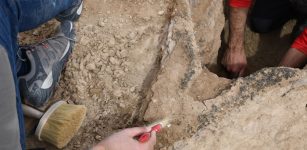 Unique, Well-Preserved 4,000-Year-Old Boat Discovered Near The Ancient City Of Uruk
Archaeology | Apr 4, 2022
Unique, Well-Preserved 4,000-Year-Old Boat Discovered Near The Ancient City Of Uruk
Archaeology | Apr 4, 2022 -
 Unexplained Mysteries Of The Superstition Mountains – A Gateway To Other Worlds?
Featured Stories | Dec 15, 2020
Unexplained Mysteries Of The Superstition Mountains – A Gateway To Other Worlds?
Featured Stories | Dec 15, 2020 -
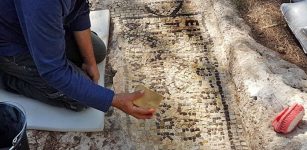 1,600-Year-Old Estate Of Wealthy Samaritan With A Rare Greek Inscription – Discovered
Archaeology | Mar 6, 2019
1,600-Year-Old Estate Of Wealthy Samaritan With A Rare Greek Inscription – Discovered
Archaeology | Mar 6, 2019 -
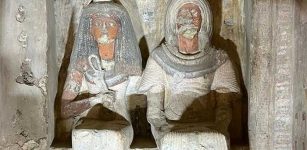 Look Inside The Amazing Egyptian Tomb Of Scribe Neferhotep In Luxor
Places | Feb 19, 2024
Look Inside The Amazing Egyptian Tomb Of Scribe Neferhotep In Luxor
Places | Feb 19, 2024 -
 Egyptians Mastered Medicine Thousands Of Years Ago
Civilizations | Oct 1, 2015
Egyptians Mastered Medicine Thousands Of Years Ago
Civilizations | Oct 1, 2015 -
 Famous Viking Warrior Eric “Bloodaxe” Haraldsson: King Of Norway
Featured Stories | Sep 29, 2016
Famous Viking Warrior Eric “Bloodaxe” Haraldsson: King Of Norway
Featured Stories | Sep 29, 2016 -
 Was The Discovery Of Biblical Abel’s Giant Grave In Syria Covered-Up?
Biblical Mysteries | Oct 28, 2014
Was The Discovery Of Biblical Abel’s Giant Grave In Syria Covered-Up?
Biblical Mysteries | Oct 28, 2014 -
 Prehistoric Human Migration In Southeast Asia Driven By Sea-Level Rise – Study Reveals
Archaeology | Feb 6, 2023
Prehistoric Human Migration In Southeast Asia Driven By Sea-Level Rise – Study Reveals
Archaeology | Feb 6, 2023 -
 No Evidence Ancient Caribbeans Were Cannibals – Scientists Say
Archaeology | Aug 23, 2021
No Evidence Ancient Caribbeans Were Cannibals – Scientists Say
Archaeology | Aug 23, 2021





